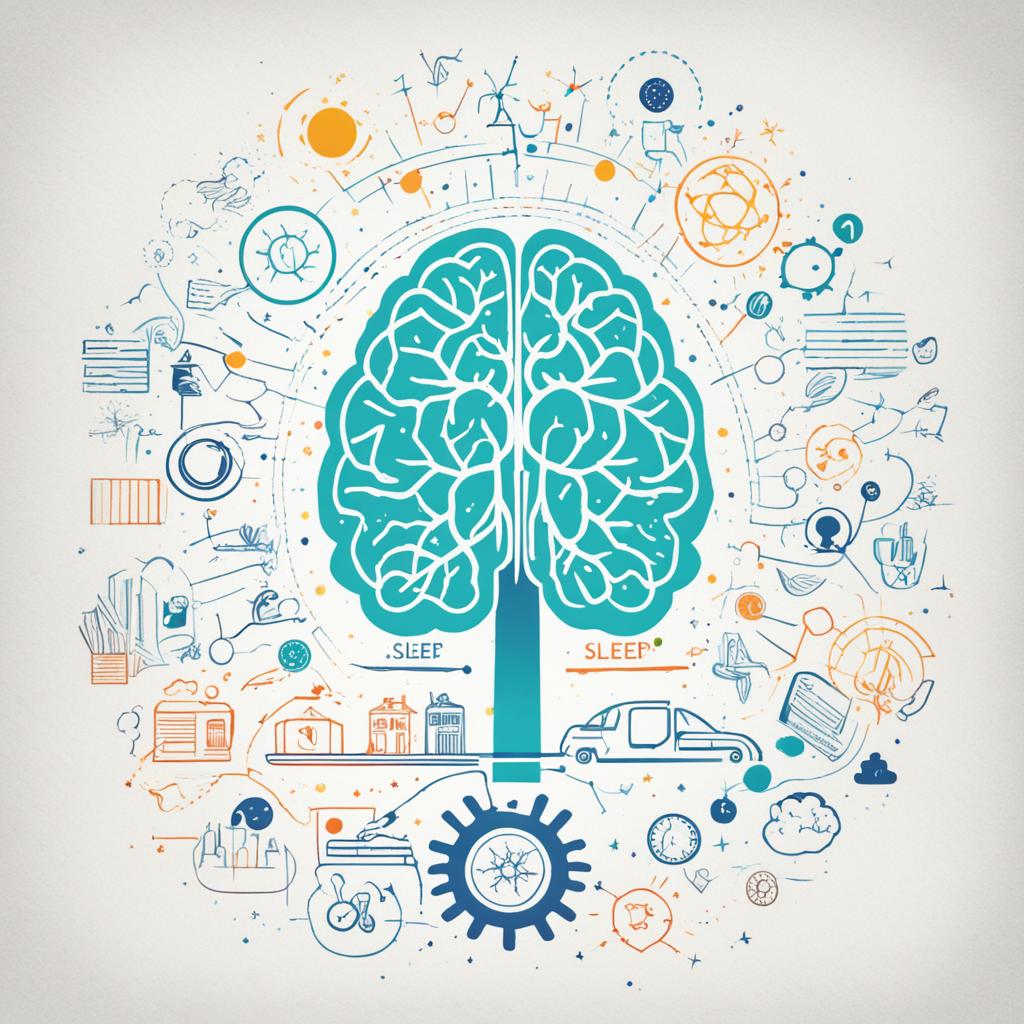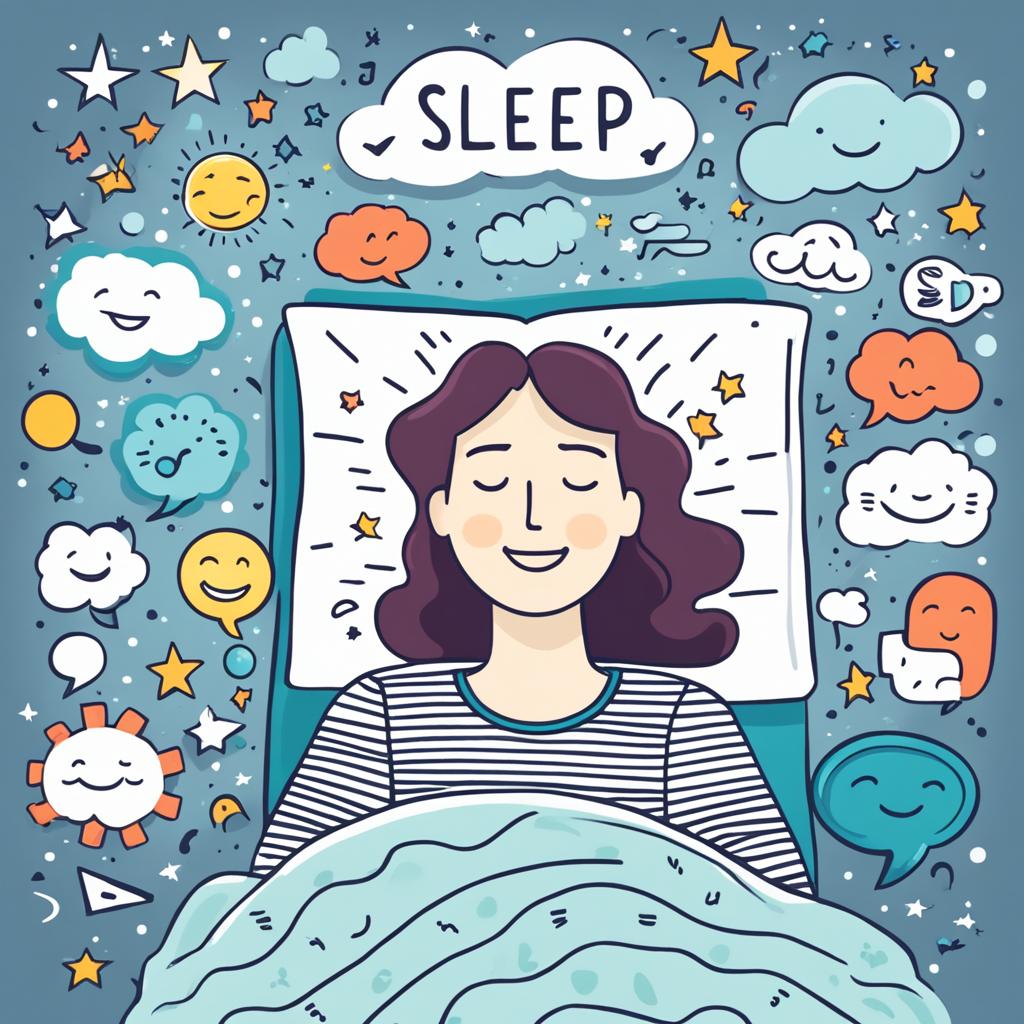Did you know that we spend about one-third of our lives sleeping? That’s equivalent to spending approximately 25 years in bed!
Restful sleep is not only a necessity but also a crucial aspect of our overall well-being. In the field of The Psychology of Sleep, experts explore the intricate relationship between sleep and our mental and physical health.
In this article, we will delve into the fascinating world of sleep and examine its impact on our daily lives. From the basics of sleep and its stages to the science behind insomnia, we will uncover the various aspects of sleep psychology.
But sleep is not just about rejuvenation. It plays a vital role in our mental health, cognitive function, emotional regulation, and even beyond. We will explore the connections between sleep and these different aspects of our well-being.
Additionally, we will delve into various sleep disorders, their psychological implications, and the role of dreams in sleep psychology. We will also highlight the relationship between sleep and physical health, discussing how inadequate sleep can impact our overall wellness.
To ensure a comprehensive understanding, we will conclude with practical tips and strategies for improving sleep hygiene and enhancing sleep quality.
So, let’s embark on this sleep journey and uncover the secrets of The Psychology of Sleep to unlock the door to better rest and well-being!
The Basics of Sleep
In order to fully understand the importance of sleep, it is crucial to explore its fundamentals. One key concept that plays a significant role in our sleep patterns is our circadian rhythm.
The circadian rhythm is like an internal clock that regulates our sleep-wake cycles. It is influenced by external factors such as light and darkness, and it helps us maintain a consistent sleep schedule. When our circadian rhythm is disrupted, it can lead to difficulties in falling asleep or staying asleep.
Sleep can be divided into different stages, each serving a unique purpose in our overall rejuvenation. These stages include:
- Stage 1 – Transition to Sleep: This is the initial stage of sleep where we start to drift off. It is a light sleep stage, and we can easily be awakened.
- Stage 2 – Light Sleep: During this stage, our brain activity slows down, and our body temperature decreases. It accounts for the majority of our sleep time.
- Stage 3 – Deep Sleep: Deep sleep is crucial for physical restoration and immune system functioning. It is during this stage that our body repairs and regenerates.
- REM Sleep (Rapid Eye Movement): REM sleep is associated with vivid dreaming and cognitive processing. It is important for memory consolidation and learning.
These stages cycle throughout the night, with each cycle lasting about 90 minutes. Understanding these stages helps us recognize the significance of a full sleep cycle and the importance of uninterrupted sleep.


The Science Behind Insomnia
Insomnia, a common sleep disorder that affects millions of people worldwide, is characterized by difficulties falling asleep or staying asleep. To understand the science behind insomnia, it is important to explore its potential causes and related psychological factors.
Causes:
Insomnia can be caused by various factors, including:
- Stress and Anxiety: High levels of stress and anxiety can disrupt sleep patterns and make it difficult to achieve restful sleep.
- Depression: Individuals with depression often experience insomnia as a symptom of their condition.
- Medical Conditions: Certain medical conditions, such as chronic pain, respiratory disorders, and hormonal imbalances, can contribute to insomnia.
- Medication and Substance Use: Certain medications and substances, such as stimulants or antidepressants, can interfere with sleep quality and lead to insomnia.
- Environmental Factors: Noise, temperature extremes, and uncomfortable sleeping environments can disrupt sleep and contribute to insomnia.
Psychological Factors:
Psychological factors play a significant role in the development and persistence of insomnia. These include:
- Racing Thoughts: Overthinking, worrying, and intrusive thoughts can keep the mind active and inhibit sleep onset.
- Hyperarousal: Increased physiological and psychological arousal can make it difficult to relax and fall asleep.
- Conditioned Insomnia: Associating the bedroom with negative sleep experiences can create a negative feedback loop and perpetuate insomnia.
- Sleep Misperception: Individuals with insomnia often have distorted perceptions of their sleep quality, leading to heightened anxiety about their ability to sleep.
Understanding the science behind insomnia is crucial in developing effective treatment and management strategies. By addressing the underlying causes and psychological factors, individuals can take proactive steps towards improving their sleep patterns and overall well-being.
Insomnia, a common sleep disorder characterized by difficulties falling asleep or staying asleep.
The Impact of Sleep on Mental Health
Quality sleep plays a crucial role in maintaining optimal mental well-being. The intricate relationship between sleep and mental health has been extensively studied in the field of The Psychology of Sleep. Sleep disturbances can have a significant impact on mood disorders, anxiety, and depression.
Research has shown that individuals who experience sleep difficulties are more prone to developing mood disorders such as depression and bipolar disorder. Sleep deprivation can exacerbate symptoms of depression, leading to increased feelings of sadness, hopelessness, and a reduced ability to concentrate.
“Sleep is that golden chain that ties health and our bodies together.” – Thomas Dekker
Similarly, anxiety disorders are closely linked to sleep problems. Chronic insomnia, characterized by difficulty falling asleep or staying asleep, often co-occurs with anxiety disorders. The sleep disturbances experienced can intensify feelings of anxiety, making it more challenging to cope with daily stressors.
It’s important to note that the relationship between sleep and mental health is bidirectional. While sleep disturbances can contribute to the development or exacerbation of mental health conditions, underlying psychological factors can also disrupt sleep patterns.
The Role of Quality Sleep
Quality sleep is essential for the restoration and rejuvenation of our brain and body. During sleep, our brains consolidate memories, process emotions, and regulate various physiological processes. Adequate sleep improves cognitive functioning, enhances emotional regulation, and reduces the risk of developing mental health disorders.
- Quality sleep contributes to greater emotional resilience and better stress management.
- It enhances the brain’s ability to regulate emotions, leading to improved overall mood.
- Sleep helps regulate the stress hormone cortisol, reducing the risk of chronic stress and its negative impact on mental health.


It’s clear that prioritizing quality sleep is essential for maintaining optimal mental well-being. By adopting healthy sleep habits and addressing any underlying sleep disturbances, individuals can significantly improve their mental health and overall quality of life.
Sleep and Cognitive Function
Quality sleep is crucial for optimal cognitive function. Sleep deprivation can significantly impact various cognitive abilities, including attention, memory, problem-solving, and decision-making.
When we don’t get enough sleep, our attention span tends to suffer. We may find it challenging to focus on tasks, maintain concentration, or stay alert throughout the day. This can have serious implications for productivity and overall performance in both academic and professional settings.
Additionally, lack of sleep can impair our ability to retain and recall information. During sleep, our brain consolidates memories, forming connections and strengthening what we have learned. Without sufficient sleep, this consolidation process is disrupted, leading to difficulties with memory formation and retrieval.
Problem-solving and critical thinking skills are also affected by sleep deprivation. When we’re sleep-deprived, our cognitive flexibility and creativity diminish, making it harder to generate innovative ideas or find effective solutions to complex problems.
Furthermore, sleep deprivation can impair judgment and decision-making abilities. Research has shown that individuals who lack adequate sleep are more likely to engage in risky behavior and make poor choices, both in personal and professional contexts.
To optimize cognitive performance, it’s essential to prioritize regular and sufficient sleep. Creating a sleep-friendly environment, establishing a consistent bedtime routine, and practicing good sleep hygiene can contribute to better sleep quality and ultimately enhance cognitive function.
It’s worth noting that the effects of sleep deprivation on cognitive function can be compared to the impairment caused by alcohol intoxication. Just as we wouldn’t expect someone under the influence of alcohol to perform at their best, we cannot expect optimal cognitive performance when sleep-deprived.
Getting the recommended amount of sleep, which is typically around 7-9 hours for adults, is vital for maintaining cognitive health and performance. By prioritizing sleep, we provide our brain the opportunity to rest, recover, and consolidate information, which leads to improved attention, memory, problem-solving, and decision-making abilities.
Key Points:
- Sleep deprivation can impair attention, memory, problem-solving, and decision-making.
- Adequate sleep is crucial for optimal cognitive function.
- Creating a sleep-friendly environment and practicing good sleep hygiene can improve sleep quality and cognitive performance.


Sleep and Emotional Regulation
Sleep plays a crucial role in emotional regulation and our ability to manage stress. Quality rest is essential for maintaining emotional well-being, as it allows our bodies and minds to recharge and recover from the challenges of daily life.
Sleep deprivation can have a significant impact on our emotional responses. When we don’t get enough sleep, we may find ourselves feeling more irritable, moody, or sensitive. It becomes harder to regulate our emotions and maintain a balanced outlook towards various situations.
Research has shown that sleep deprivation affects the amygdala, a part of the brain responsible for processing emotions. When sleep is compromised, the amygdala becomes more active, leading to heightened emotional reactions and difficulty in managing stress.
Additionally, sleep deprivation can impact our ability to think clearly and make rational decisions, further exacerbating emotional challenges. It becomes harder to problem-solve and find constructive ways to cope with stressful situations.
“Sleep is the best meditation.” – Dalai Lama
On the other hand, getting sufficient sleep allows us to regulate our emotions more effectively. It enhances our resilience and helps us respond to stress with greater clarity and composure.
Implementing healthy sleep habits, known as sleep hygiene, is crucial for emotional well-being. This involves establishing a consistent sleep schedule, creating a sleep-friendly environment, and practicing relaxation techniques before bed to promote restful sleep.
By prioritizing adequate sleep and following good sleep hygiene practices, we can support our emotional regulation and enhance our overall well-being.


Sleep Disorders and Their Psychological Implications
When it comes to The Psychology of Sleep, sleep disorders play a significant role in disrupting our sleep patterns and overall well-being. Conditions such as sleep apnea, narcolepsy, and restless legs syndrome can have profound psychological implications, impacting our mental health and quality of life.
One of the most common sleep disorders, sleep apnea, is characterized by breathing pauses or shallow breaths during sleep. This interruption in breathing can result in fragmented sleep, leaving individuals feeling tired, irritable, and experiencing difficulties with concentration and memory. The constant sleep disruption in sleep apnea can lead to mood disorders, such as depression and anxiety.
Narcolepsy, on the other hand, is a neurological disorder that affects the brain’s ability to regulate sleep-wake cycles. Individuals with narcolepsy often experience overwhelming daytime sleepiness, sudden and uncontrollable episodes of falling asleep, and cataplexy, which involves the sudden loss of muscle tone. These symptoms can significantly impact an individual’s psychological well-being and overall quality of life, leading to depression, anxiety, and feelings of social isolation.
Restless legs syndrome is a condition characterized by an irresistible urge to move one’s legs, especially when trying to sleep or relax. This movement can disrupt sleep, causing excessive daytime sleepiness and negatively affecting mood and cognitive functions. The constant discomfort and sleep disturbances associated with restless legs syndrome can contribute to increased stress levels, leading to psychological distress.
It is important to recognize that sleep disorders can have far-reaching psychological implications. The disruptions in sleep caused by these disorders can impact our mental health, cognitive abilities, and emotional well-being. Seeking professional help and treatment for sleep disorders is crucial in order to mitigate their impact and improve overall sleep quality.
Individuals suffering from sleep disorders encounter unique challenges that go beyond just the physical symptoms. It is essential to address both the psychological and physiological aspects of sleep disorders to ensure comprehensive and effective treatment.
By understanding the psychological implications of sleep disorders, we can better comprehend the complex interplay between sleep and mental health. Recognizing the importance of addressing both aspects of sleep disorders is crucial for achieving optimal well-being and quality of life.


The Role of Dreams in Sleep Psychology
In the field of The Psychology of Sleep, dreams have long fascinated researchers and individuals alike. While their exact meaning and purpose remain a subject of debate, dreams play a significant role in our sleep psychology.
Different theories surround dreams and attempt to explain their potential functions and significance. One prevalent theory is that dreams serve as a way for our brains to process emotions and memories. During sleep, the brain engages in various cognitive processes, including consolidating and organizing information from our waking experiences.
Dreams often incorporate elements of our daily lives, such as people, events, and emotions. They may offer a canvas for our unconscious mind to explore unresolved issues or process complex emotions. In this way, dreams can provide insights into our psychological well-being and help us gain a deeper understanding of ourselves.
“Dreams are the touchstones of our character.” – Henry David Thoreau
While some dreams may seem random or nonsensical, others can be vivid and emotionally charged. They can evoke powerful feelings and elicit profound experiences, creating a unique window into our inner world during sleep.
Research suggests that dreams can also play a role in problem-solving and creativity. In dreams, our minds are free from the constraints of reality, allowing for novel connections and innovative ideas to emerge. Artists, writers, and inventors have often drawn inspiration from their dreams, harnessing their potential for imaginative thinking.
The study of dreams in sleep psychology continues to evolve, with ongoing research exploring their intricate mechanisms and functions. While we may not fully understand the true nature of dreams, their presence in our sleep experiences is undeniable.
Theories on the Function of Dreams
- The Psychodynamic Theory: Dreams serve as a pathway for the expression of unconscious desires and repressed emotions.
- The Activation-Synthesis Theory: Dreams are a result of random electrical impulses in the brain, and the mind attempts to create a narrative or meaning from these signals.
- The Threat Simulation Theory: Dreams simulate potentially threatening situations, allowing us to practice and prepare for real-life challenges.
These theories provide differing perspectives on the purpose and significance of dreams, highlighting the complexity of our dream experiences and their potential impact on our waking lives.
Sleep and Physical Health
Quality sleep not only impacts our psychological well-being but also plays a crucial role in our physical health. Adequate sleep is essential for the proper functioning of our body systems and the maintenance of overall wellness. The field of The Psychology of Sleep encompasses the study of how sleep affects our physical health and the potential risks associated with inadequate rest.
One aspect worth noting is the relationship between sleep and obesity. Research has shown that inadequate sleep can disrupt hormonal balance, leading to an increased appetite and a higher likelihood of weight gain. Lack of sleep affects the hormones that regulate appetite, such as leptin and ghrelin, causing an imbalance that can contribute to unhealthy eating habits and weight management difficulties.
Moreover, insufficient sleep has been linked to an increased risk of cardiovascular diseases. Chronic sleep deprivation can have a negative impact on various cardiovascular processes, including blood pressure regulation, inflammation levels, and the function of the blood vessels. These factors can contribute to the development of conditions such as hypertension, atherosclerosis, and heart disease.
Another significant aspect is the effect of sleep on the immune system. During sleep, our body undergoes essential processes that support immune function, including the release of certain proteins and the activation of immune cells. When sleep is consistently disrupted or insufficient, these processes may be compromised, leading to a weakened immune system and an increased susceptibility to illnesses and infections.
“Sleep is the golden chain that ties health and our bodies together.” – Thomas Dekker
It is evident that sleep and physical health are closely intertwined. To maintain a healthy body and reduce the risk of various health conditions, prioritizing quality sleep is essential. By ensuring adequate sleep duration and improving sleep quality through sleep hygiene practices, we can contribute to our overall well-being and optimize our physical health.
Next, we will explore the importance of sleep hygiene and practical strategies for enhancing sleep quality, enabling you to establish a solid foundation for optimal rest and well-being.
Sleep Hygiene and Improving Sleep Quality
To achieve optimal sleep quality and promote overall well-being, it is crucial to practice good sleep hygiene. Sleep hygiene refers to a set of habits and behaviors that contribute to a restful and refreshing sleep experience. By prioritizing sleep hygiene, you can enhance your sleep quality, improve daytime functioning, and support your psychological and physical health.
Create a Sleep-Friendly Environment
Your sleep environment plays a significant role in influencing the quality of your sleep. Consider the following tips:
- Keep your bedroom cool, quiet, and dark to create a comfortable sleeping environment.
- Invest in a comfortable mattress and pillows that suit your sleep preferences.
- Minimize external disruptions, such as noise or excessive light, by using earplugs, eye masks, or blackout curtains.
Establish a Consistent Bedtime Routine
A bedtime routine helps signal your body that it’s time to wind down and prepare for sleep. Create a consistent routine by:
- Choosing a regular bedtime that allows for sufficient sleep duration.
- Engaging in relaxing activities before bed, such as reading a book, taking a warm bath, or practicing gentle stretching exercises.
- Avoiding stimulating activities, such as using electronic devices or consuming caffeine, close to bedtime.
Manage Technology Use Before Sleep
The excessive use of electronic devices, such as smartphones, tablets, and computers, can interfere with sleep quality. Consider the following strategies:
- Avoid using electronic devices for at least an hour before bed to limit exposure to blue light, which can suppress the production of sleep-inducing hormones.
- Establish a technology-free zone in your bedroom to promote relaxation and reduce distractions.
- If you need to use electronic devices, consider using blue light filters or applications that adjust the screen’s color temperature as the evening progresses.
“Creating a sleep-friendly environment and establishing a consistent bedtime routine can greatly improve your sleep quality.” – Dr. Sarah Johnson, Sleep Psychologist
By implementing these strategies, you can prioritize sleep hygiene and optimize your sleep quality. Remember that improving sleep quality requires consistency and commitment to healthy sleep habits. By taking care of your sleep, you can enhance your overall well-being and enjoy the benefits of a restful and rejuvenating night’s sleep.
Conclusion
In this comprehensive exploration of The Psychology of Sleep, we have delved into the intricate connection between sleep and our psychological and physical well-being. Quality sleep plays a crucial role in maintaining optimal mental health, cognitive function, emotional regulation, and overall physical health.
Throughout the article, we have learned about the fundamentals of sleep, the science behind insomnia, and the impact of sleep disturbances on mental health. We have also examined the crucial role of sleep in cognitive function, emotional regulation, and its relationship to various sleep disorders.
It is clear that prioritizing quality sleep and adopting healthy sleep hygiene practices is essential for our overall well-being. By establishing a consistent bedtime routine, creating a sleep-friendly environment, and managing technology use before sleep, we can enhance our sleep quality and reap the numerous benefits that come with it.
As we conclude, let us remember that investing in our sleep is an investment in our mental and physical health. By understanding and valuing The Psychology of Sleep, we can strive for a balanced and rejuvenating sleep, ultimately leading to a healthier and happier life.
